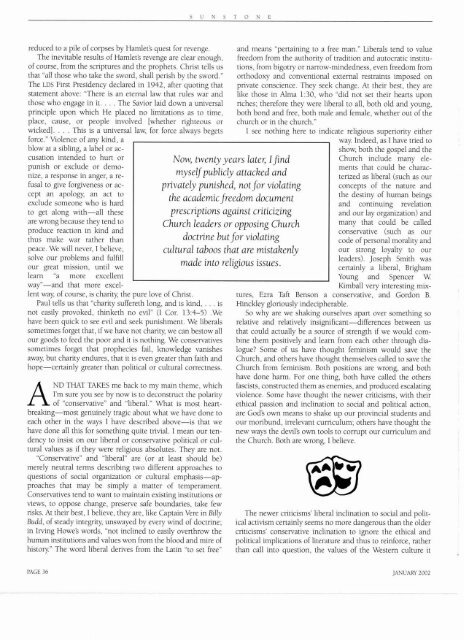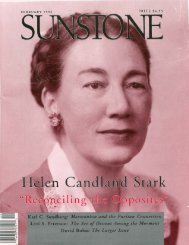Eugene England - Sunstone Magazine
Eugene England - Sunstone Magazine
Eugene England - Sunstone Magazine
Create successful ePaper yourself
Turn your PDF publications into a flip-book with our unique Google optimized e-Paper software.
educed to a pile of corpses by Hamlet's quest for revenge.<br />
The inevitable results of Hamlet's revenge are clear enough,<br />
of course, from the scriptures and the prophets. Christ tells us<br />
that "all those who take the sword, shall perish by the sword."<br />
The LDS First Presidency declared in 1942, after quoting that<br />
statement above: "There is an eternal law that rules war and<br />
those who engage in it. . . . The Savior laid down a universal<br />
principle upon which He placed no limitations as to time,<br />
place, cause, or people involved [whether righteous or<br />
wicked]. . . . This is a universal law, for force always begets<br />
force." Violence of any kind, a<br />
blow at a sibling, a label or ac-<br />
cusation intended to hurt or<br />
punish or exclude or demonize,<br />
a response in anger, a refusal<br />
to give forgiveness or accept<br />
an apology, an act to<br />
exclude someone who is hard<br />
to get along with-all these<br />
are wrong because they tend to<br />
produce reaction in kind and<br />
thus make war rather than<br />
peace. We will never, I believe,<br />
solve our problems and fulfill<br />
our great mission, until we<br />
learn "a more excellent<br />
wayn-and that more excellent<br />
way, of course, is charity, the pure love of Christ.<br />
Paul tells us that "charity suffereth long, and is kind, . . . is<br />
not easily provoked, thinketh no evil" (I Cor. 13:4-5) .We<br />
have been quick to see evil and seek punishment. We liberals<br />
sometimes forget that, if we have not charity, we can bestow all<br />
our goods to feed the poor and it is nothing. We conservatives<br />
sometimes forget that prophecies fail, knowledge vanishes<br />
away, but charity endures, that it is even greater than faith and<br />
hope-certainly greater than political or cultural correctness.<br />
A<br />
ND THAT TAKES me back to my main theme, which<br />
I'm sure you see by now is to deconstruct the polarity<br />
of "conservative" and "liberal." What is most heart-<br />
breaking-most genuinely tragic about what we have done to<br />
each other in the ways I have described above-is that we<br />
have done all this for something quite trivial. I mean our tendency<br />
to insist on our liberal or conservative political or cultural<br />
values as if they were religious absolutes. They are not.<br />
"Conservative" and "liberal" are (or at least should be)<br />
merely neutral terms describing two different approaches to<br />
questions of social organization or cultural emphasis-approaches<br />
that may be simply a matter of temperament.<br />
Conservatives tend to want to maintain existing institutions or<br />
views, to oppose change, preserve safe boundaries, take few<br />
risks. At their best, I believe, they are, like Captain Vere in Billy<br />
Budd, of steady integrity, unswayed by every wind of doctrine;<br />
in Irving Howe's words, "not inclined to easily overthrow the<br />
human institutions and values won from the blood and mire of<br />
history." The word liberal derives from the Latin "to set free"<br />
Now, twenty years late? Ifind<br />
myself publicly attacked and<br />
privately punished, not for violating<br />
the academic freedom document<br />
prescriptions against criticizing<br />
Church leaders or opposing Church<br />
doctrine but for violating<br />
cultural taboos that are mistakenly<br />
made into religous issues.<br />
and means "pertaining to a free man." Liberals tend to value<br />
freedom from the authority of tradition and autocratic institutions,<br />
from bigotry or narrow-mindedness, even freedom from<br />
orthodoxy and conventional external restraints imposed on<br />
private conscience. They seek change. At their best, they are<br />
like those in Alma 1:30, who "did not set their hearts upon<br />
riches; therefore they were liberal to all, both old and young,<br />
both bond and free, both male and female, whether out of the<br />
church or in the church."<br />
I see nothing here to indicate religious superiority either<br />
way Indeed, as I have tried to<br />
show, both the gospel and the<br />
Church include many elements<br />
that could be characterized<br />
as liberal (such as our<br />
concepts of the nature and<br />
the destiny of human beings<br />
and continuing revelation<br />
and our lay organization) and<br />
many that could be called<br />
conservative (such as our<br />
code of personal morality and<br />
our strong loyalty to our<br />
leaders). Joseph Smith was<br />
certainly a liberal, Brigham<br />
Young and Spencer W<br />
Kimball very interesting mixtures,<br />
Ezra Taft Benson a conservative, and Gordon B.<br />
Hinckley gloriously indecipherable.<br />
So why are we shaking ourselves apart over something so<br />
relative and relatively insignificant-differences between us<br />
that could actually be a source of strength if we would combine<br />
them positively and learn from each other through dialogue?<br />
Some of us have thought feminism would save the<br />
Church, and others have thought themselves called to save the<br />
Church from feminism. Both positions are wrong, and both<br />
have done harm. For one thing, both have called the others<br />
fascists, constructed them as enemies, and produced escalating<br />
violence. Some have thought the newer criticisms, with their<br />
ethical passion and inclination to social and political action,<br />
are God's own means to shake up our provincial students and<br />
our moribund, irrelevant curriculum; others have thought the<br />
new ways the devil's own tools to corrupt our curriculum and<br />
the Church. Both are wrong, I believe.<br />
The newer criticisms' liberal inclination to social and political<br />
activism certainly seems no more dangerous than the older<br />
criticisms' conservative inclination to ignore the ethical and<br />
political implications of literature and thus to reinforce, rather<br />
than call into question, the values of the Western culture it<br />
PAGE 36<br />
JANUARV ZOO2

















